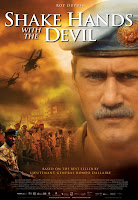 The film is brilliant. Award winning Canadian actor Roy Dupuis gives a powerful and convincing portrayal of Dallaire. The cinematography is beautifully rendered, depicting the stunning landscape of Rwanda (amazingly, the movie was actually filmed on location in Rwanda using the historical sites of the events portrayed). Although the historical violence was gruesome and barbarous, the violence in the film is subtly depicted but powerfully implied. Unlike The film Hotel Rwanda, which loosely covers the same events, Shake Hands is less graphic. There are, however, some shots of corpses and mutilated bodies in Shake Hands, but the film focuses more on Dallaire’s reactions to the atrocities. The impact of the horrors of the Rwanda crisis is conveyed forcefully by Dupuis. The filmmakers frequently limit the viewers to see firsthand the atrocities; rather we are only permitted to see Dupuis’s reaction to corpses and violence. As a result, the depth of the situation resonates with viewers.
The film is brilliant. Award winning Canadian actor Roy Dupuis gives a powerful and convincing portrayal of Dallaire. The cinematography is beautifully rendered, depicting the stunning landscape of Rwanda (amazingly, the movie was actually filmed on location in Rwanda using the historical sites of the events portrayed). Although the historical violence was gruesome and barbarous, the violence in the film is subtly depicted but powerfully implied. Unlike The film Hotel Rwanda, which loosely covers the same events, Shake Hands is less graphic. There are, however, some shots of corpses and mutilated bodies in Shake Hands, but the film focuses more on Dallaire’s reactions to the atrocities. The impact of the horrors of the Rwanda crisis is conveyed forcefully by Dupuis. The filmmakers frequently limit the viewers to see firsthand the atrocities; rather we are only permitted to see Dupuis’s reaction to corpses and violence. As a result, the depth of the situation resonates with viewers.The film raises the question of foreign intervention in domestic affairs. Certainly, UN peacekeeping missions should not “take sides” in a dispute but was there not a mandate to protect lives and actually "keep peace"? While the atrocities were unfolding, the US and other nations refused to use the word “genocide”---had the term been officially accepted, international law demands intervention. Like the Dallaire himself, the film “pulls no punches in his condemnation of top UN officials, expedient Belgian policy makers and senior members of the Clinton administration who chose to do nothing as Dallaire pleaded for reinforcements and revised rules of engagement.”**
Despite the unpleasant and gruesome content, I highly recommend the film. Its relevance is especially poignant in light of recent national debate over Canada’s role in Afghanistan. It also asks the question of legitimate use of force. At one point in the film, a Rwandan woman cries out to Dallaire asking why he didn’t protect the victims of a recent attack: “Why don’t you protect us?! You have guns!” Even more poignant is Dallaire’s use of his personal weapon. He never fires his gun until the end of the film. The reason for the display of force is to protect three goats. A couple of stray dogs were attacking the goats, and in order to protect them, he fires his gun at the attackers. The result is the goats are saved. The implication is this: had Dallaire been permitted to use force against the aggressive instigators of violence (symbolically the dogs), he could have saved the innocent Rwandans (symbolically the goats).
The trouble with pointing fingers is that we are arguing in the realm of “what if…?” If the UN had responded with force, would the genocide have been quelled? Dallaire and the filmakers makes a powerful argument that UN intervention would have prevailed. I am reminded of Edmund Burke’s famous statement: “All that is necessary for the triumph of evil is that good men do nothing.” This was certainly the case in Rwanda.
**From the review of the award winning documentary film, Shake Hands with the Devil: The Journey of Roméo Dallaire.





No comments:
Post a Comment